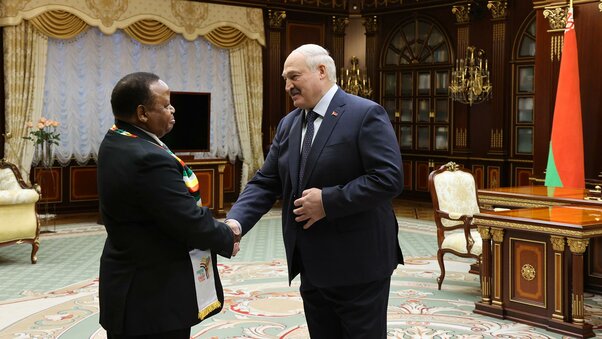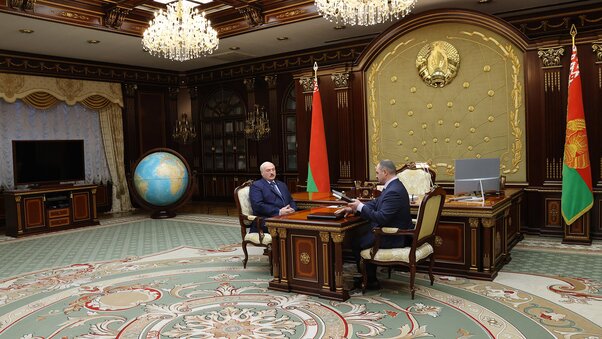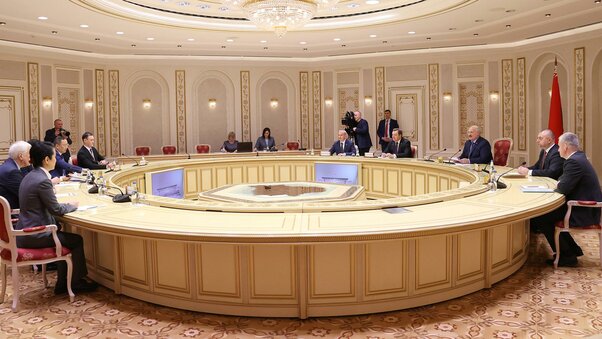Meeting with Governor of Russia’s Kaluga Oblast Vladislav Shapsha
- 14
- 7:25
The people of Belarus and Russia have become even more united and stronger, Belarusian President Aleksandr Lukashenko said as he met with Governor of Kaluga Oblast of Russia Vladislav Shapsha on 3 April.
“In recent years - and we state this openly - our countries, Russia and Belarus, have become much closer to each other. This is not only thanks to our relations at the highest political level, but, as always, thanks to our contacts with the regions of the Russian Federation. We have launched a lot of efforts at the level of governments, enterprises and organizations, looking for ways out of the difficult situation around our countries together. This has united our nations even more (and we can see it) and made us stronger,” Aleksandr Lukashenko said.
The President is convinced that a significant contribution to the record-high trade between Belarus and Russia in 2022 was made by the implementation of agreements with the heads of Russian regions. Active contacts with Kaluga Oblast is no exception here. “They did not stop for a single day, thanks to which we have created a certain reserve. I will not hide it - our goal is to surpass $1 billion in trade and achieve a full balance,” the head of state said.
“To put it frankly, our goal is to hit the one billion dollar mark in trade and achieve a complete balance. Minsk and Kaluga should make the most of their cooperation. As experience shows, our economies are complementary. Belarusian and Russian enterprises are naturally integrated into joint production chains,” Aleksandr Lukashenko noted.
According to him, this is taking on new significance as the two countries are working to promote industrial cooperation, introduce new high-tech technologies, and substitute import.
“We are well familiar with your potential. We have a history of successful projects to set up industrial parks and free economic zones. It is vital to use our potential after many Western companies left Russia. We need to figure out how we could get integrated into these structures and manufacture much-needed products. In other words, our cooperation is now as important as never before,” Aleksandr Lukashenko emphasized.
The construction sector is the core of trade and economic cooperation between Belarus and Kaluga Oblast, the head of state noted. Belarusian construction workers are building housing and social facilities in the Russian region. “As far as I know, you are by and large satisfied with the pace and quality of the works. We are ready to engage in a detailed and substantive dialogue on this topic and will pay heed to all remarks, suggestions and wishes on ongoing projects,” Aleksandr Lukashenko said.
Belarus is also ready to meet the needs of Kaluga Oblast in passenger, municipal and agricultural machinery. According to the President, the availability of certain financial instruments can make Belarusian goods even more attractive to consumers.
“The sanctions imposed by the West disrupted the established international supply chains in the food sector. We foresaw such scenarios and took the necessary steps in advance. As you know, Belarus is one of the world's leading exporters of meat and dairy products. The production of virtually all staple foods significantly exceeds their consumption in the country,” the head of state noted.
At the same time, Belarus is consistently working to upgrade its processing industry, Aleksandr Lukashenko said. The agricultural sector is also a priority in Kaluga Oblast. “We are ready to provide assistance, if necessary, with dairy production, we can also supply elite seeds of Belarusian selection, as well as highly productive feed and premixes from BNBC, our biotechnology corporation,” the President said.
Aleksandr Lukashenko noted that the parties can go beyond the designated range of cooperation areas. “There are no off-limits topics between us. We are ready to listen to and take on board all your proposals,” he emphasized.
In 2022, the trade between Belarus and Kaluga Oblast approached $654 million, down by about 6% over 2021. At the same time, Belarus increased exports to this Russian region by almost 70%, but the trade deficit for Belarus remained.
Belarus exported oil products, metal structures, furniture, dairy products, cement, concrete and artificial stones to Kaluga Oblast and imported polypropylene, animal feed, ethylene polymers, TV sets, monitors and projectors, vacuum cleaners, beer, automobiles, non-alloy steel bars, aluminum bars and profiles.


